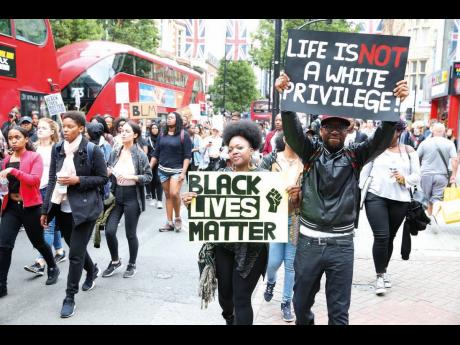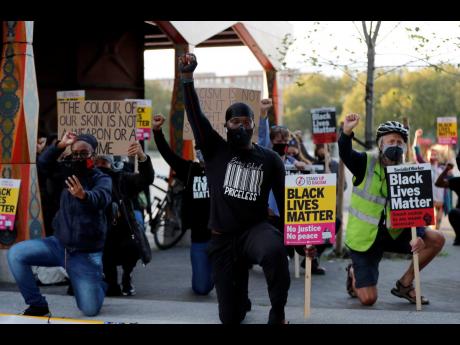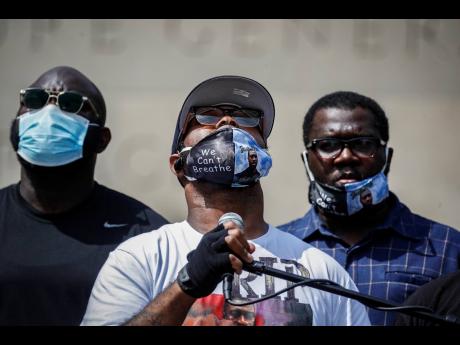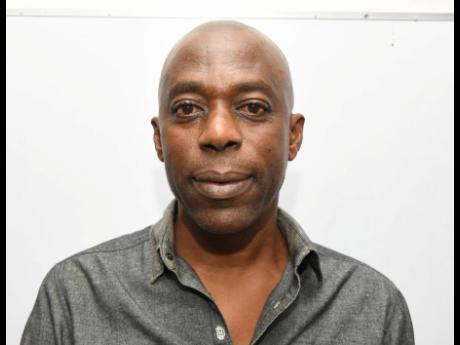Herbert Gayle | How long will George Floyd’s ghost haunt us?
In my first class in violence studies, my white female professor stated: “There are two philosophical pillars that guide violence experts that make us different from development practitioners. 1. Every perpetrator is also a victim. 2. Saving or changing one perpetrator is cheaper than saving 100 victims.” I was amazed by the logic but disturbed by the immorality of the principle. I raised my hand and made my position clear. I told her that while it was true, it was impractical as humans see the victim first. She pointed out that I had left out philosophy number 1 and proceeded to suggest that people choose who they wish to brand as victims. I then asked: “Prof, how does a group become branded as a victim?” She looked at me as if to say “Seriously!” Then she calmly suggested: “Campaigning, through the use of propaganda, which means making sure your side stays in the public ears.”
Black Lives Matter was formed in 2013 but became an international campaign after the gruesome death of George Floyd. The impact of his death has been profound. Let me illustrate. In 2017, three groups asked me to speak on International Men’s day, and nine asked me to speak on International Women’s Day. In 2018. five groups asked me to speak for the Men’s Day and 13 for the Women’s Day. That year was, however, marked by deep national insult as I was asked to help launch a regional women’s advocate platform on Father’s Day. This caused Jamaican men to come together to block the event. But note the audacity and ease of abuse. No male could think to do any such thing on Mother’s Day – and none would call a female expert to present on such a blasphemous occasion. Last year, another five groups asked me to present for International Men’s Day, and 17 for International Women’s Day. This year, 107 groups from nine countries asked me to present on International Men’s Day. I asked every group why, and their response suggested that they were haunted by George Floyd’s ghost. How long will he haunt us? Is this another nine-day-wonder? If you go to Google and type in ‘International Men’s Day Because’ you will see that people went all out to make this year’s event count. They have actually listed seven disadvantages that men face. This is very new. Is this a sign that men are becoming less invisible in the gender conversation?
HIT AND MISS
As a Generation X person, I have seen a lot of hit and miss. I do not have the luxury of the gracious hope I hear from my Millennial research team. I am also a violence expert who sees the dead bodies and understand how structural violence kills far more than actual physical violence. Hence, I am not as optimistic. I have even met younger colleagues who feel confident that “this is the start of something grand”. In this context, the point of comparison is the success of women’s campaign in the last 50 years. Gender, politics, and religion are among the areas of discussion that carry more sentience (emotion) than science (reality). However, let us try to assess the assertion that George Floyd’s ghost will haunt us to the extent of creating worldwide impact beyond 2022. I use this period because I am trained to know that unsupported campaigns have impact ranging from 18-24 months. Then they die! Beyond that ‘natural impact point’, you must have funding. Why are campaigns important? According to Edwin Ott, knowledge is achieved through repeated exposure to a string of information. Knowledge is not reality! Reality is that which exists independent of your sentience, or emotions, or perception. In other words, we can all hold on to something that is not true. In campaigning, it is not the truth that is important. It is the capacity to push one’s side of reality.
With billions of dollars invested in the women’s movement, there has been massive improvement in the lives of women, especially in Jamaica. In 1970, only 64 women attended university compared to 100 men. Today, there are 228 women in university compared to 100 men. In 1980, one-third of all women first had sex under the age of 16 years. According to the Women’s Health Survey, Jamaica (2016), this dropped to 14 per cent. However, men’s data have remained unchanged. In the 1980s, two-thirds of men first had sex under the age of 16. Today, (2020 Male Fertility Preliminary) data say the same two-thirds; and in 42 per cent of the cases, the female partner could have been arrested. Prior to the Civil Rights Movement, black women were targeted with their black men by the US police. Today, black women’s campaign has paid off. The US police kills 17 males to 1 female – but 26 black men to 1 black woman. Black women are no longer the number-one group of women attacked by the state. In the USA, police account for 1 out of every 100 black males killed. In Jamaica, our police account for 13% of all males killed. To every 105 males killed by our police, 1 female is killed – often by accident. Put simply, poor urban black males in Jamaica are 13 times worse than their counterparts in the USA. Yet we promote SOE and all forms of brutal oppression of the young men under the name of social order.
I have established that campaigns are necessary; that they have worked for women, especially black women; and that young people believe that we are turning a corner. I have also implied that I am preoccupied with helping Jamaica (and other countries) change the reality of young black men. However, I have not emphasised why I am doing this. I hinted earlier that all violence experts (those of us trained) understand that you cannot reduce violence without some degree of focus on the group that is branded the perpetrator. We cannot solve Jamaica’s murder problem by simply herding the young men into slaughter houses. Hence, my preoccupation with helping young men is not because I am a man. I pledged to help reduce violence in the region, and I cannot fulfil that professional promise without making us understand that an angry, neglected, abused male is a potential killer of our own doing. As I declared in Europe 10 years ago – if the Caribbean can provide inner-city boys with 50 per cent of the life chances of inner-city girls, our murder rate would easily drop below the civil war benchmark of 30 per 100,000 – the point where policing begins to make sense.
BEGINNING
Like all my younger and untrained friends, I see George Floyd’s ghost as a beginning. My concern is that black men may not have the resources to sustain any campaign 10 per cent as effective as that of their female counterparts. I ask that you brutally criticise my scepticism. I promise that I will become more hopeful if you can answer the following questions?
1. How are black men comparable to black women when they are only a disadvantaged subset? Men are the wealthiest and most powerful people on Earth. In Jamaica, men dominate the top quintile – but also the bottom. In other words, while women can find common ground of suffering, black men are simply the exception to the rule of power. Currently, the wealthiest men do not support the poorest or weakest ones. To illustrate: only five per cent of inner-city youth have ever been assisted by wealthy men through mentorship or grants or group funding. But 13 per cent of inner-city youth have received help from successful women. This is one of the core reasons why many ‘partnerists’ (I am included here) have tried to promote women to positions of power. Powerful men are simply crueller than powerful women.
2. Can black people unite enough and quickly enough to make George Floyd’s ghost stay beyond 2022? We represent the best ‘divide and conquer’ victims in history. Part of my contention with the feminist movement is that it reminds me of my father’s control of the birds we raised when I was a child. My father would cut off one of the bird’s wings? and let them go in the yard. They would try to fly but end up going round in circles. The first time I saw it, I cried. I was seven years old. They could not escape his brutal control. The North has always controlled the South. During chattel slavery, they used black men to oversee other black men – and in the middle were the house slaves (mostly women). Women also had access to Sunday market and could save money. This remains the arrangement of Jamaica – men at the top and bottom; women in the middle. After Emancipation, the planters ensured that males were not educated to guarantee the plantation cheap labour. This is why Jamaica has 15 all-girl schools and only sven for boys. Since the 1970s, the bulk of development monies have gone to women. There is a non-contextual assumption that all men are the same, and hence we are to support girls while boys remain invisible. This is why I asked a group of women recently, which is easier to have: an MA or a MAN? In the USA, black people could not unite to remove President Trump. A lot of them voted for him. How do we unite them?
3. How do you get black women to see black men as their partners? The North-funded feminist movement has made many black women see black men as permanent perpetrators and the problem. Drawing on the work of seven student groups’ work, we know that Jamaican women are changing rapidly to help their black brothers survive. There is hope in these data: in 2006 only 18 per cent of young women saw men as partners; in 2020 it is 30 per cent. But how do we get the others to join this kind of progressive thinking?
4. Who will fund the black men’s campaign so that this fever goes beyond 2022? Black women benefit from UN women. We cannot have a UNmen – as men run the UN. So shall we expect to have a UN Black men? Wealthy men fund themselves and women – as they do not wish to compete with poorer and weaker men. Women are still in need of support and are preoccupied with their own campaign. Remember that it is difficult to see the plight of others when you are focused on your own. International development partners (IDPs) have told me that they see no male funding coming soon. So where will the money come from?
5. Are we assuming that men and women’s neurobiological advantages and socialisation are the same? Most men are communication-disadvantaged, ego-restricted, and help-seeking retarded. Men do not make it easy for others to help them as they do not seek help. Why should any group go the extra mile to help a group of angry black men who do not even know how to articulate their pain? Where is this extra empathy going to come from? Black men certainly cannot do this on their own – they will need black women – and in return, black men will worship their black women.
In closing, the timing of George Floyd’s ghost is certainly the most powerful tool to unite black people. Nonetheless, with only 30 per cent of their female counterparts recognising them as partner (and not tormentor or ATM), it is going to be a long and painful road to get black men to a state where they do not rely primarily on violence to survive or express their frustration. I firmly believe that only through partnership will we be able to fly over the fence. We have to grow both wings. This will take time and effort. We must do it together – men and women. We must have a course set by us and not by the North. We must try.
Productive International Men’s Day. Again condolences to the family of George Floyd and the millions of other families that have lost their sons to violence in the Americas.
Herbert Gayle is a social anthropologist and lecturer in the Department of Sociology, Psychology and Social Work at The University of the West Indies.




